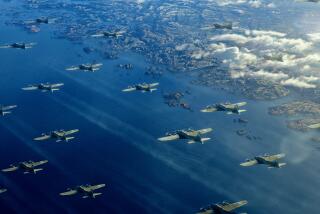POWs as ‘Shields’ : Iraq Sends Captured Allied Airmen to Strategic Sites : Cloud Cover Hampers Bombing
- Share via
RIYADH, Saudi Arabia — Iraq turned people into weapons today, scattering POW pilots about the country at the sites of military targets as “human shields”--a move that recalled the early days of the invasion of Kuwait when hundreds of foreigners were used as shields.
The airmen--American, British and Italian--appeared grim-faced on Iraqi television Sunday and on American television today--before being moved to places that the Iraqis described as “civilian, economic, education and other targets.”
Several of the airmen denounced the war with Iraq, but their halting words and stilted phrases were obviously prompted by the Iraqis.
The Iraqi announcement that the pilots had been moved raised a major outcry from the United States and Britain, while the International Red Cross--responsible for monitoring the Geneva conventions--said that moving the prisoners to likely bombing sites was a violation of the accords.
The footage shown of the American prisoners this morning showed the pain of their captivity, with their bruises, cuts and swollen faces.
Marine Chief Warrant Officer Guy Hunter Jr. did not look at all convinced when he stared into the camera and said: “I think our leader and our people have wrongly attacked the peaceful people of Iraq.”
The movement of the airmen was reminiscent of what happened to expatriates living in Iraq and Kuwait when the Iraqis invaded last Aug. 2. Almost all of them were held for months before being released after Iraqi President Saddam Hussein realized there was no practical value in keeping them there.
On this, the fifth day of the war against Iraq, military jets from the allied nations bombed strategic sites in Iraq and Kuwait, despite a cloud cover that has hampered those operations somewhat.
Maj. Gen. Burton R. Moore, the director of operations for the United States Central Command, said today that more than 8,100 sorties had been flown since last Wednesday and that two more Iraqi aircraft had been shot down, bringing the total to 17. He also said another American plane, a Navy F14 Tomcat, was shot down today, raising the total number of U.S. planes lost in combat to nine.
Moore also said that nine Scud missiles launched on Riyadh and Dhahran, in eastern Saudi Arabia, had been shot down late last night and in the early morning today.
And while the military said it tracked one Scud as it fell harmlessly into the sea, it landed about a mile from the Marraq Air Base in Bahrain, the main British base for the Tornado and Jaguar fighters being used in the war with Iraq.
Moore said that Hussein would be held responsible for his actions. He was also questioned about the Iraqi president’s possible strategy, in which Hussein absorbs all the punishment that can be doled out by the allies, then comes back to fight all the harder.
It is widely believed that the best of Hussein’s troops, the Republican Guard, are nowhere near the battlefront, but further back preparing to take on the allied forces after they have been wearied by the first assaults.
“That is always a possibility,” said Moore. “We plan to execute our campaign and plan for the worst and hope for the best.”
More to Read
Sign up for Essential California
The most important California stories and recommendations in your inbox every morning.
You may occasionally receive promotional content from the Los Angeles Times.













